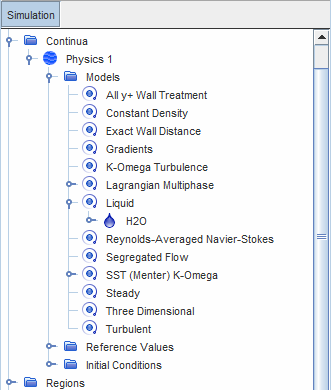Selecting the Physics Models
Physics models define the primary variables of the simulation, including pressure, temperature, velocity, and what mathematical formulation is used to generate the solution.
Several models are required in this tutorial as there is not only a turbulent continuous phase to consider, but also the particle motion within the continuous phase. Two different strategies are employed within Simcenter STAR-CCM+ to simulate these phases. The continuous fluid phase is modeled using an Eulerian formulation whereby fluid properties are obtained at fixed points throughout the fluid domain. The particulate phase is modeled using a Lagrangian method where the trajectories of representative particles are tracked throughout the continuous phase.
Simcenter STAR-CCM+ permits two-way coupling between the continuous fluid phase and dispersed particulate phases. For this tutorial, however, the coupling is not considered to reduce the amount of simulation time required.
Only one region for the continuous phase is required for this analysis. By default, the continuum Physics 1 is automatically created when the mesh is imported. The continuum is edited so that appropriate physical models are selected for the water fluid region.
To select the physics models:
-
For the physics continuum,
, select the following models in order:
Group Box
Model
Enabled Models
Three Dimensional (Pre-selected)
Time
Steady
Material
Liquid
Flow
Segregated Flow
Gradients (selected automatically)
Equation of State
Constant Density
Viscous Regime
Turbulent
Reynolds-Averaged Navier-Stokes (selected automatically)
Reynolds-Averaged Turbulence
K-Omega Turbulence
SST (Menter) K-Omega (selected automatically)
All y+ Wall Treatment (selected automatically)
Wall Distance (selected automatically)
Optional Models
Lagrangian Multiphase
- Click Close.
-
To review the models, open the
node.

- Save the simulation.